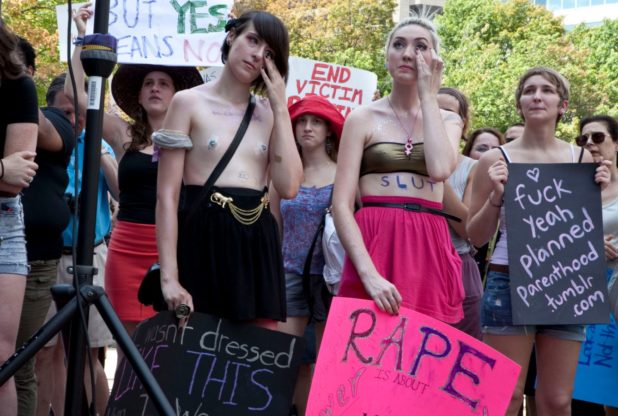Andrew Anglin
Daily Stormer
January 10, 2018
French Actress Catherine Deneuve
Leave it to the French to be the voice of reason in a debate about sexual puritanism.
And of course, that is what we are now talking about as far as the Metoo movement goes: a new form of sexual puritanism. What women are asking is that we return to a very specific Anglo-Saxon set of sexual norms, wherein a man making advances on a woman is considered crude and inappropriate.
It is very similar to the situation with the blacks now requesting racial segregation.
But of course, there is a catch: blacks are asking that they be able to choose to segregate when it benefits them, as well as be around white people when it benefits them. Just so, women are demanding to be protected from the sexuality of men, while also being free to engage in whatever type of sexual behaviors they themselves wish to behave in.
So, there is certainly an argument for returning to Anglo norms in terms of sexuality in society – but it would need to go both ways. Creating a situation where women are running around whoring it up while men are banned from complimenting women is a deranged type proposition.
AFP:
France’s most revered actress Catherine Deneuve hit out Tuesday at a new “puritanism” sparked by sexual harassment scandals, declaring that men should be “free to hit on” women.
She was one of around 100 French women writers, performers and academics who wrote an open letter deploring the wave of “denunciations” that has followed claims that Hollywood producer Harvey Weinstein raped and sexually assaulted women over decades.
They claimed that the “witch-hunt” that has followed threatens sexual freedom.
“Rape is a crime, but trying to seduce someone, even persistently or cack-handedly, is not — nor is men being gentlemanly a macho attack,” said the letter published in the daily Le Monde.
“Men have been punished summarily, forced out of their jobs when all they did was touch someone’s knee or try to steal a kiss,” said the letter, which was also signed by Catherine Millet, author of the hugely explicit 2002 bestseller “The Sexual Life of Catherine M.”.
Men had been dragged through the mud, they argued, for “talking about intimate subjects during professional dinners or for sending sexually-charged messages to women who did not return their attentions.”
The letter attacked feminist social media campaigns like #MeToo and its French equivalent #Balancetonporc (Call out your pig) for unleashing this “puritanical… wave of purification”.
…
“Instead of helping women, this frenzy to send these (male chauvinist) ‘pigs’ to the abattoir actually helps the enemies of sexual liberty — religious extremists and the worst sort of reactionaries,” the collective of women who signed the letter said.
“As women we do not recognise ourselves in this feminism, which beyond denouncing the abuse of power, takes on a hatred of men and of sexuality.”
They insisted that women were “sufficiently aware that the sexual urge is by its nature wild and aggressive. But we are also clear-eyed enough not to confuse an awkward attempt to pick someone up with a sexual attack.”
The French have a totally different conception of sexuality than Northern Europeans and especially America. So this all makes perfect sense.
At least some of the women engaged in this Metoo movement do appear to be trying to return to some kind of sexually puritanical state, but that isn’t actually what they are arguing for, because they don’t understand that this is where their motivations are coming from.
I am able to believe that a woman in the workplace who is constantly being hit on, often presumably by men she does not find attractive who think they have a chance with her because of a power-dynamic, feel as though they are under a sustained assault.
At the same time, there is an opposing drive in women to get as much attention as possible, and though attention from higher value men is of higher value, all attention is valuable.
The conflict between these two opposing drives in a woman simply demonstrates that she is not a conscious independent agent in society, capable of making decisions about her own life.
It is similar to a child who begs its parents to allow it to eat as much candy as it wants, then when the parents allow it, it gets sick feeling angry at and betrayed by its parents.
Point being: they are not making a rational request.
Attempting to break down the behavior of women along logical lines is a fool’s errand. We should instead be forcing them to do what is beneficial to the whole of society. This will generally also be what makes them happy, however I don’t think that we should use “women’s happiness” as a measure of anything, due to their fickle nature and inability to understand their own emotions.



